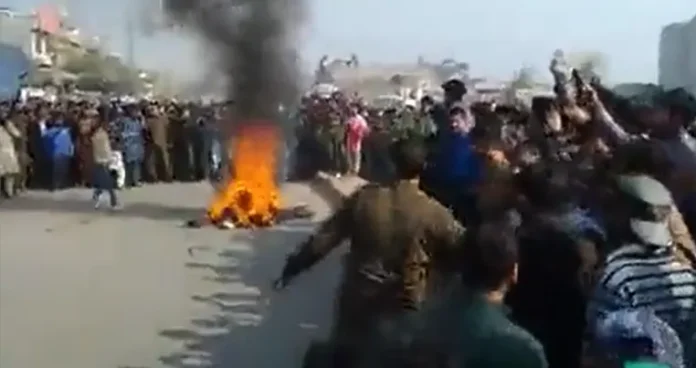A mob of hundreds of Sialkot factory workers killed their superior for allegedly committing blasphemy. According to reports, the gang first tortured him to death and then burnt his lifeless body. The Sri Lankan citizen Priyantha Kumara was the export manager at the factory. Some social media reports claimed that his workers found an Islamic religious verse in his office’s trash can and assumed that he threw that away intentionally. Pakistan’s Chief Minister Usman Buzdar said that action would be against “those who take law in their own hands”. The tragic Sialkot incident has raised debate on radicalism in Pakistan with respect to the issue of blasphemy. People are asking why violence in response to even alleged acts of blasphemy is a norm in Pakistan and not in other Muslim countries like UAE or Qatar etc.
Sialkot Incident over Fake Accusation of Blasphemy
Activists and journalists pointed out that blasphemy allegations were not even eligible because it was just assumptions, and nobody tried to investigate the matter. The mob just killed him without confirming the complete facts. Sialkot incident was clearly a murder, and no such reference of allegations like blasphemy could justify that. The critics on social media are questioning the extremist narratives propagated by the religiopolitical parties that turn out to be the cause of such events.
Is State to be Blamed for Weaponizing Blasphemy?
For some, the culprits of the Sialkot incident were all of those workers involved in the killing of Kumara. However, some also debated how the state has weaponized blasphemy for decades to pursue political gain. A similar incident occurred in 2019 when a mob attacked a Hindu teacher in Ghotki over fake blasphemy allegations. Many Pakistanis, including celebrities, raised their voice to eliminate the causes of radicalism. Recently Pakistani government faced criticism for giving in to the demands of extremist religious outfit TLP (Tehreek-E-Labbaik Pakistan) by unbanning them from politics and releasing their leader. The citizens are now arguing if the state’s inability to implement its writ against the religious parties that propagate extremist ideologies is one of the reasons that make such mob violence a norm or not.
Even the blasphemy laws in Pakistan that have origin in British colonial rule are very controversial. The proponents often argue that these laws can prove beneficial in preventing mob violence in blasphemy cases as the state has defined a way to decide on such matters. However, history proves otherwise; very often, the misuse of these blasphemy laws for political gains has been observed as a common practice. Even several political parties use religious slogans in their election campaign as well.
Due to such an exploitation of a religious ideology for political motives, people are blaming the state for indirectly being complicit in all this.
Response from the Government
Pakistan’s Prime Minister Imran Khan said that it was a “day of shame” for Pakistan in response to the Sialkot incident. He claimed that the government has already started to arrest the culprits and assured to punish every last one of them.


